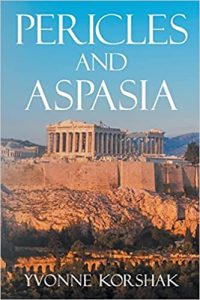PERICLES AND ASPASIA: A Story of Ancient Greece by Yvonne Korshak
PERICLES AND ASPASIA: A Story of Ancient Greece by Yvonne Korshak
From the Author and Historian—Inspirations for Writing Pericles and Aspasia
 Someone recently asked me, “Since you’ve been a non-fiction author in the past, what compelled you to write fiction?” My answer is that I was not compelled to write fiction—I was compelled to write this story. The reasons? The time and place, the characters of Pericles and Aspasia, and their unlikely romance.
Someone recently asked me, “Since you’ve been a non-fiction author in the past, what compelled you to write fiction?” My answer is that I was not compelled to write fiction—I was compelled to write this story. The reasons? The time and place, the characters of Pericles and Aspasia, and their unlikely romance.
It started in high school ancient history class, where I had to write a report on ancient Greece. Mine was on Greek theater, and I was fascinated by the playwright Euripides who was described as “the first modern mind.” All I was learning about the period seemed surrounded by a kind of glow, and I fell in love with the classical world.
That’s how I landed in classical Athens in the 5th century BC, over 2500 years ago, and I’ve never strayed far from there since.
Classical Greece and the period I fell into, often called “the golden age,” has been a worthy love, filling my life and imagination with joy and purpose—but here the metaphor between romantic love and my love of ancient Greece breaks down. Because, and in strong contrast to romantic love, as I discovered more about the period, I wanted others to know about this wonderful world and what I had learned. Ultimately, to share that knowledge, and the enchantment, I wrote Pericles and Aspasia.
The golden age in Greece, and Athens, during the 5th century BC, a little over 2500 years ago, was a time of astonishing cultural achievements and many thrilling “firsts.” Athens, led by Pericles was the world’s first great democracy—how is that for a “first”! The writing of history was invented.
Phidias, perhaps the greatest sculptor who ever lived, designed the famous sculptures of the Parthenon temple on the Athenian Acropolis, including the Elgin marbles that are housed in the British Museum in London—the Greeks and the British are currently engaged in a tug-of-war concerning the ownership of these sculptures. It was a period of great philosophy—Socrates walked the streets of Athens, barefoot we are told. Of the four outstandingly great playwrights in Western culture, Aeschylus, Sophocles, Euripides, and Shakespeare, three of them lived at this time! I have never gotten over that.
Athens was a democracy, and Pericles held led the city through the powerful vision and his oratorical skills. History reports that he said in a speech: “Our constitution is called a democracy because power is in the hands not of a minority but of the whole people . . . everyone is equal before the law.”
Simple words—but new on the face of the earth!
It is no exaggeration to say that Pericles, along with the architects and sculptors, had an equal hand in building the Parthenon and other great artistic achievements that bring so many visitors to Athens. Drawing on his compelling will, he fought off opposition and, through his oratory, persuaded the democratic Assembly to grant the funds, for instance, to build the Parthenon temple. This period is called “Periclean Athens,” so dominant was Pericles as a thinker and a mover. That’s what Aspasia appreciates about him in my novel. Some people are great thinkers, others are great doers, but Pericles was a thinker and a mover.
I was intrigued by the strength of Pericles’ love for Aspasia, a passion that led him to divorce his well born Athenian wife (who then married a man she had always wanted), and to risk his reputation, his influence, his ardor for leadership–everything that determined his course before he met Aspasia—all to love her without compromise. Eros, who sets love into motion, is a great god.
Because Aspasia had come to Athens from another Greek city and earned her living as a hetaira (“courtesan,” “geisha,” “companion”), she was of lesser status than citizen women. She was educated, however, unlike most Athenian woman, a trump card in playing the game of love with Pericles, a man who loved knowledge. Although she started out in Athens on a low rung of the social ladder, her education and her intelligence, charm, and fluency with language that is mentioned by ancient writers, attracted the most important man in the city. When Aspasia gave birth to their son, even though the boy was illegitimate, Pericles gave him his name, and Young Pericles grew to be a general, like his father.
At a time and place where women generally were limited by societal norms to “the women’s quarters,” Aspasia moved freely among men, absorbing their ideas and contributed her own ideas to their thinking. She conversed with the great artists and thinkers of Athens and (though not everything they wrote about her is accurate), they took her seriously. The philosopher Plato depicts her teaching Socrates how to speak effectively in public. Aspasia mattered at a time when women lived secluded lives, under the thumbs of male relatives. For Aspasia in my novel, some of her most thrilling moments are when she has the joy of seeing that people are listening to what she has to say and learning from her.
Thus, Periclean Athens and its two famous lovers, Pericles and Aspasia, inspired me to write the book. But there are also intangibles, having something to do with the region of the Mediterranean . . . Greece . . . the music . . . the wine . . . the beauty of islands rising, both stark and inviting, from the Aegean Sea . . . and that glow in high school ancient history.
—
Yvonne Korshak received her B.A. with honors from Harvard University, Masters in Classics and Classical Archaeology and PhD in Art History from the University of California, Berkeley.
As a professor at Adelphi University, she has taught Art History and topics in the Humanities, served as Chair of the Department of Art and Art History, Director of the Honors Program in Liberal Studies, and Director of a National Endowment for the Humanities Summer Institute. She has written and spoken widely on topics of Greek art and archaeology and on European painting, particularly on van Gogh, Courbet, and David. Her blog, “Let’s Talk Off-Broadway,” focuses on art and theater.
She has excavated at Old Corinth, Greece, and has visited almost all the cities, towns, landscapes, and seascapes in Greece—and what today is Turkey—that figure in Pericles and Aspasia.
PERICLES AND ASPASIA
 Two lovers crest the wave of the golden age of Athens: Pericles, statesman and general, and Aspasia, his courtesan, a philosopher’s daughter and a brilliant woman in her own right. In a world of hierarchies, he is at the top when she arrives as little more than flotsam cast up on Athenian shores. Their love transcends social sanctions, enduring and deepening despite the grave threat it presents to Pericles’ reputation as a leader of the Athenian democracy.
Two lovers crest the wave of the golden age of Athens: Pericles, statesman and general, and Aspasia, his courtesan, a philosopher’s daughter and a brilliant woman in her own right. In a world of hierarchies, he is at the top when she arrives as little more than flotsam cast up on Athenian shores. Their love transcends social sanctions, enduring and deepening despite the grave threat it presents to Pericles’ reputation as a leader of the Athenian democracy.
The novel unfolds against the background of the arts and history of the Golden Age seen through the eyes of two individuals who lent their particular brilliance to make it “golden,” Pericles, the great orator and visionary of democracy and its most influential woman, Aspasia. Their story takes them from the Agora-Athens’ marketplace-to the Acropolis, from the mercantile, raunchy Athenian Port Piraeus across the Aegean Sea to East Greece. Pericles and Aspasia-together and apart-navigate treacherous paths from venal calculations to impassioned philosophical inquiry, from high-stakes sea battles to the passions of family life.
Pericles and Aspasia engages issues that are vital today-the paradoxes of democracy, the tensions of hierarchy, the ironies of gender, and others-but this novel is immersed in classical Athens: the city, its sunshine, its physical presence, its people and their struggles and aspirations.
BUY HERE
Category: On Writing























